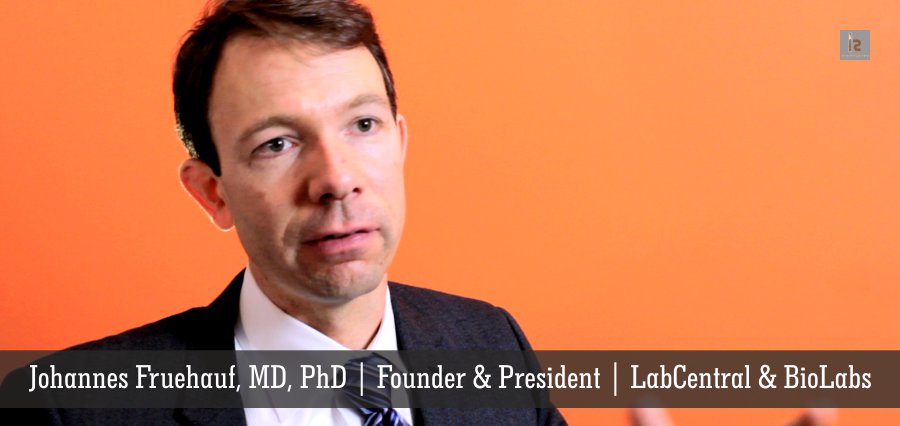In an interview with Insights Success, Johannes Fruehauf, Founder and President of LabCentral and BioLabs, speaks about his experiences that shaped his entrepreneurial journey into a successful one. Also, he broadly discusses the companies’ core competencies and the services they offer.
Below are the highlights of the interview conducted between Johannes and Insights Success:
How do you diversify your organizations’ offerings to appeal to the target audience?
In each of our facilities, we engage key partners to realize our vision. Those key partners include state and local governmental agencies with an interest in economic development, universities, research hospitals, big pharmacy, instrument manufacturers, and others who want to interface with our innovators. Each brings its own viewpoint that help tailor how these projects develop.
We understand the needs of our resident startups; as entrepreneurs and founders ourselves, we’ve walked in their shoes. Our model is not a real estate transaction, but an ecosystem created for entrepreneurs to enrich their business. Multidimensional in our approach, we connect our different stakeholders who contribute and benefit, bringing a 360° perspective. We’re in a continuous dialogue with residents, sponsors, and the larger community, so that’s how we fine-tune our model, adding products and services to meet current and future needs.
For example, we developed our LabCentral 610 “graduation-labs” site for companies that outgrew our entry-level offerings. It wasn’t something we’d ever even thought of in the beginning. But residents requested to remain within our supportive environment as they grow, meet their milestones and start their next stage of development.
Describe some of the vital attributes that every entrepreneur should possess.
Fearless, relentlessly optimistic and motivated are the key aspects. At times, it may even be helpful to be so focused to be blind to some realities. It’s their energetic determination and an unyielding drive to have an impact that allows fledgling startups to succeed against entrenched big business. Of course, in our field of science, entrepreneurs must be grounded in both the science and their business segment.
What were the past experiences, achievements or lessons that have shaped your journey?
I was quite unprepared when we started Cequent. In retrospect, if I hadn’t had to learn everything the hard way building a lab, a team, and a company from the ground up, maybe my co-founder and I wouldn’t have been so driven to invent a new, more-efficient path for creating startups.
I grew up and received my medical training in Europe. As an immigrant, I had never really been exposed to the idea of venture-funded companies until I came to Boston. Here, I saw an industry that is turning academic ideas into real-world applications. It’s probably not surprising that we see a large number of startups being founded by immigrants. After all, immigrants embody those vital attributes in their daily lives when they risk packing up and leaving their own country to come here.
How do you strategize your game plans to tackle competition in the market?
We are going places that we never dreamed of when we started the co-working movement for biotech startups. We don’t tackle the competition. We lead; others follow. And we’re proud of that! Since you used the word “tackle,” I’ll use an American football analogy. If your running back breaks through the defensive line, he runs toward the end zone as fast as he can. He realizes that he’s being chased, but he doesn’t slow down to engage. We’re like that RB—we keep on full speed, with our focus on the end zone.
What were the primal challenges and roadblocks you faced during the initial phase of your career as an entrepreneur?
In the initial days, like every business, we faced challenges. Some only become visible in hindsight. When starting Cequent, my lack of experience in building and running business operations was probably my biggest. But I had the invaluable opportunity to work alongside an experienced mentor, Peter Parker. That’s an important learning: if you know where you want to go but you’re uncertain about the path. Look for mentors who have demonstrated successes to help you.
Another obstacle we face frequently is the skepticism of the surrounding world when we present a new concept. Be driven and assertive when you know your idea is right. You just have to work hard to prove it to others.
Where do you see yourself in the near future and what are your future goals?
In the near term, we plan to continue to expand our network of lab facilities in the US and internationally as well as our fund activities. We believe that we can provide a valuable overall platform for innovation in our industry and aim to reach even more teams of founders.
What is your advice for budding and emerging entrepreneurs?
Get on the calendar of as many experienced founders and investors as possible to ask these role models for advice; don’t be shy but do be respectful of their time. On entrepreneurship: just do it; don’t wait, there’s always going to be a thousand reasons why the time isn’t ideal, steel your courage and jump in.
About the Leader
In 2006, Johannes co-founded a biotech startup, Cequent Pharmaceuticals, and since then founded and co-founded several others. Although glass-filled co-working labs for life sciences seem ubiquitous today, in 2013, when his cofounder, Peter Parker, and he opened LabCentral in Kendall Square, many shook their heads. No researcher would dare to put their precious IP in such close proximity to others.
Johannes knew they had activated a paradigm shift for high-achieving founders and their companies through their co-working environments built at BioLabs and LabCentral. It took just a few years to prove the nay-sayers wrong. In fact, they believe they changed the industry, or to be precise, gave birth to a new one. They dramatically increased the capital efficiency of starting biotechs through their innovation communities by a factor of up to 10 to even 20 and companies enjoyed a greatly increased likelihood of success.


